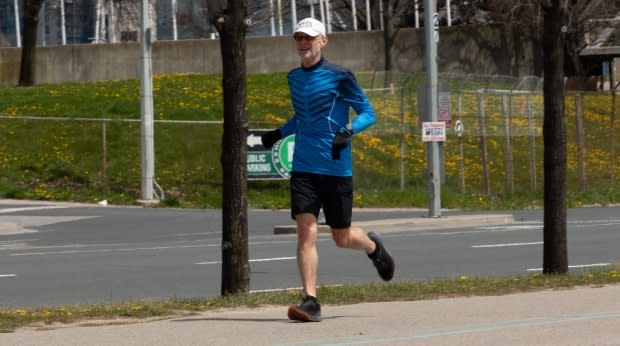Number of COVID-19 deaths in Toronto tops 500 as city announces ActiveTO plan
More than 500 people have now died of COVID-19 in Toronto as officials announced a plan to create more space for pedestrians and cyclists on city streets.
Dr. Eileen de Villa, the city's medical officer of health, told reporters that she continues to hear stories about the 504 people who have died of the disease in Toronto while the pandemic continues to grip the city.
There are 391 people in hospital with 99 in intensive care units due to COVID-19, she added.
"There isn't a day that goes by where I don't reflect on these tragic losses," De Villa said at a city hall news conference on Wednesday.
"On behalf of my team, I extend my deepest sympathies to those who have lost loved ones, and wish a speedy recovery to those who are sick."
The city reported 217 new COVID infections on Wednesday, with a cumulative total of 6,665 cases. Of this total, 6,019 are confirmed cases while 646 are probable cases. A total of 4,273 people have recovered from the disease.
De Villa revealed the latest numbers after Mayor John Tory announced a new plan called ActiveTO in which city staff will create more space for people to get outside and move around safely. He said he pushed staff to produce a "more aggressive timeline" for the plan.
The plan, details of which are to revealed next week, involves the creation of "quiet streets" that are closed to all but local traffic, closing some major roads near trails and attractions where there has been crowding, and the building of more cycling infrastructure. The city plans to create 50 kilometres of quiet streets, he said.
"We will need more road space for walking, we will need calm streets, we will need more bike infrastructure, Transportation services and Toronto public health are working together on a plan to provide more space for pedestrians, cyclists and transit riders to allow for better physical distancing," Tory said.
"We want to move forward with this."
In a news release, the city said: "ActiveTO is about making sure people have space to get outside, have space to get around while respecting physical distancing, and when it comes to the larger bike lane projects, that we have a safety valve when it comes to the TTC."
The city could close some roads completely on weekends, while some may be only partly closed. City staff will monitor traffic on adjacent roads to gauge the impact, Tory added.
As well, the city's 10-year bike route plan will be accelerated, Tory said. City staff will talk to councillors about what could happen in their wards, he added.
The plan comes as the city is changing its messaging slightly as the weather gets warmer, from urging people to stay home as much as possible to encouraging them to keep their distance when outside.

Under the plan, being developed by Toronto Public Health and Transportation Services, the city will look at:
Creating quiet streets, which are defined as local routes with traffic calming measures in place. Local car traffic will be allowed only to create space for pedestrians and cyclists.
Closing major streets near major trails or recreational attractions where there has been crowding on weekends and holidays. Some streets would be completely closed to traffic, but the closures could be temporary, such as on weekends. When this happens, on a trial basis, staff will monitor nearby roads and adjust plans as necessary.
Expanding the city's cycling network by creating more bike lanes. This plan includes the creation of temporary bike lanes. According to the mayor, the city plans to "accelerate key parts of the council-approved cycling network plan" and bikeways along major TTC routes.
"We know we need a safety valve for our transit system because some people may be hesitant to ride the TTC for health-related reasons," Tory added.
'We need to keep Toronto moving'
For her part, De Villa said she is pleased that the city is rolling out its ActiveTO plan because it will help Toronto residents stay active as the city continues to fight COVID-19.
"We know that mobility is key to recovery. This is why, as our recovery process begins, we need to keep Toronto moving," she said.
De Villa said walking and biking remain healthy activities despite the pandemic, as the World Health Organization has urged.
"These modes of active transportation not only provide physical distancing, but can significantly reduce our risk of chronic diseases and improve our mental health," she said.

COVID-19 spreads through contact with respiratory droplets of someone infected with the virus and the droplets can spread up to two metres, she said, adding that close, prolonged contact creates the highest risk for infection.
"So what does this mean? This means that the risk for becoming infected with COVID-19 while passing someone on the street, walking trail or bike path is low," she said.
By heeding public health directives to stay at home as much as possible and practise physical distancing, Toronto residents have managed to avert a much worse outbreak, she added.
"If you hadn't done your part, we could have been experiencing similar tragedies seen in other parts of the world. But we are not out of the woods yet and we need to remain diligent and focused."
City opens 2nd COVID-19 recovery site for homeless
In a news release, the city said it will open a second recovery site on Friday for people experiencing homelessness who have tested positive for COVID-19.
The city said the downtown recovery site, which it called a "unique and a new integrated model for shelter and health care," is opening with the help of the University Health Network, Inner City Health Associates, a group of more than 100 doctors working in more than 50 shelters and drop-ins in Toronto, and community agencies. The site will have room for 250 people.
Doctors Without Borders, an emergency humanitarian medical organization, is also involved, providing advice on logistics and infection, prevention and control management.
"It isn't a hospital because people do not require acute care. It also isn't a shelter because there are additional infection control measures in place similar to health care settings, as well as other wraparound health supports," the city said.
"It is critical to our response that people who are homeless and who are ill with COVID-19 have a safe space to recover outside of the shelter system to prevent the spread of infection. The city will provide medical care, nursing, substance use care and overdose prevention services, mental health support, and community, peer and personal support.
Once a person has recovered, he or she will be referred to the city's "hotel-based shelter program" or directly to housing where possible.
A 200-bed COVID-19 recovery site for people experiencing homelessness opened in April.
The city said it also has obtained a supply of personal protective equipment (PPE) for shelter workers.

Leave foxes on boardwalk alone, city urges
Toronto Fire Chief Matthew Pegg, head of the city's emergency response team, told reporters that the city erected barricades Wednesday to protect a family of foxes that have made a home under the boardwalk at Woodbine Beach.
The barricades are intended to discourage people from bothering the foxes. Bylaw officers are also patrolling the area to help protect the foxes and for public safety.


